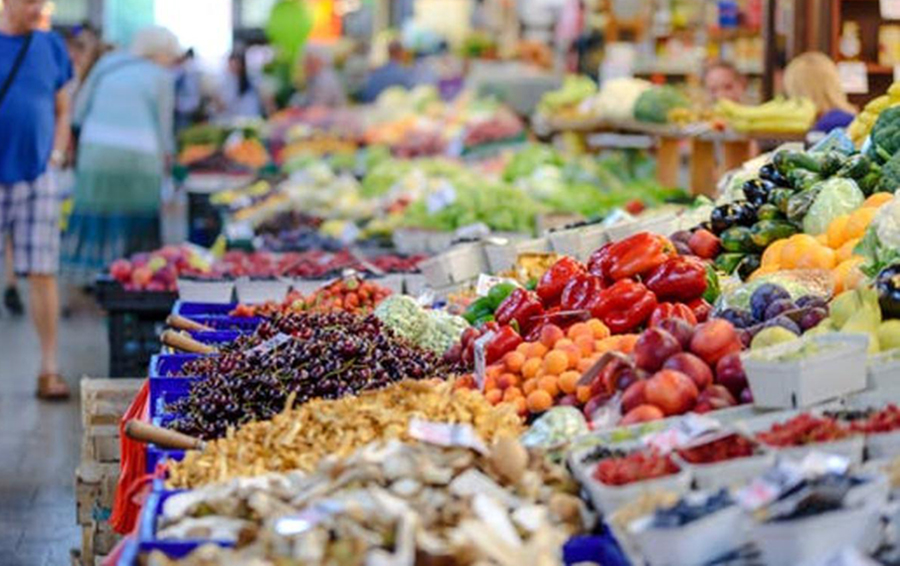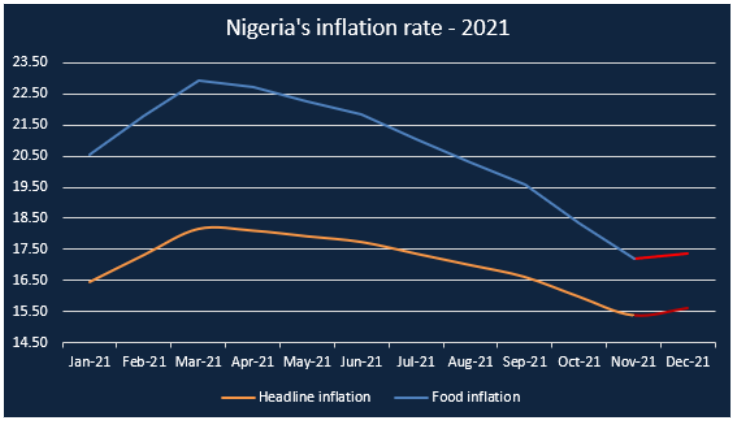The National Bureau of Statistics released Nigeria’s inflation figures for the month of December 2021 on Monday, which to the surprise of many analysts, was an uptick compared to the previous month despite recording steady declines in 8 successive months.
The change in the direction of the rate comes as a surprise to most economic analysts, considering that the rate had been going through a moderation from the highs recorded in the previous year, leveraging on favourable base periods.
Specifically, according to the NBS, Nigeria’s consumer price index rose by 15.63% year-on-year in December 2021, compared to the rate of increase recorded in the preceding month (November 2021 – 15.4%).
Inflation figure for the review month was driven by the increases recorded in the two components of the consumer price index. Notably, the highly watched food index increased from 17.21% in November to 17.37% in the month under review.
Similarly, core inflation which excludes the prices of volatile agricultural produce stood at 13.87%, a marginal increase compared to 13.85% recorded in the previous month.
However, the National Bureau attributed the increase in the food inflation rate to a surge in the prices of bread and cereals, proteins foods like fish, meat, and egg. Also, the increase in the prices of beverages contributed to the surge in the food price index.
What experts are saying
In the expert opinion of Olumide Adesina, a financial analyst at Quantum Economics, the surge in Nigeria’s inflation rate was due to the festivities in the month of December. “As a result of the festive season, Nigeria’s inflation rate surged by 230 basis points to 15.63% in December 2021 after 8 consecutive months of decline,” he said.
According to him, the mid-term impact of such metrics will continually erode the purchasing power of Nigeria’s most vulnerable households and hinder Nigeria’s economic recovery. He also added that, if double-digit inflation persists in 2022, it will negatively impact long-term borrowing and lending by distorting government, household, firm consumption, investment, and saving decisions.
On the other hand, Samuel Bamidele, Head of Research and Intelligence at Phillips Consulting Limited, said that he was not surprised with the figures, which he believed was triggered by the higher-than-expected household consumption during the Christmas festivities.
“Of course, the high-base effect of inflation decline has weaned. However, the December spike must have been triggered by higher-than-expected household consumption spending during the festive period,” he said.
“According to the report, food inflation is the driver, with a 2.19% month on month increase, that’s the highest since May 2017. The question that needs answering is what factors drove food inflation apart from demand? Without recycling the known factors, let’s wait for January digit, and the picture will become clearer,” he added.
Meanwhile, Bamidele projects that Nigeria’s inflation will remain on the upside in the year. “Three major factors that will potentially shape prices in the year are the potential subsidy removal which will trigger fuel hike, electricity hike and the import pass through another FX adjustments.”
On the other hand, Uche Nwachukwu, an investment analyst with one of the investment houses in Nigeria confirmed that it was a surprise to have seen the inflation figures rise in December. “It was a negative surprise,” he said. The view ahead of the report was for base effects to continue to offset monthly trends in keeping the annualised reading lower, he explained.
“However, this seems to have ended in December where m/m came in strong, driven by pressures in food prices. The pressures were driven by the farm produce segment and were across rural and urban inflation,” he added.
The strong monthly print in December which is within the seasonal harvest period suggests renewed supply chain pressures on food, this could either be due to insecurity or some other issues.
He, however, opined that this sets things up for the first MPC meeting of 2022, which is scheduled for later in the month, where the CBN as with global central banks will be under pressure to rein above-target inflation.
According to Charles Abuede, a financial analyst and business expert, “no one may have expected the halt in the disinflation trend as the data from the NBS on Monday signals that consumer prices rose at a faster pace in December.
“This was a result of the festivities where prices rose without looking back as well as the unabating FX pressure on the naira in the currency market and the insecurity situation in the country.”
He also mentioned the effects of the food inflation rate on the headline inflation, which printed 17.4% in the review period. “This points to the fear of the farmers to return to the farmlands due to clashes with the herders in the northern region as well as other security measures in some southeastern states,” he said.
According to Opeoluwa Dapo-Thomas, a global market analyst, he explained that he was not surprised by the uptick, considering the likes of US and the United Kingdom also recorded faster inflation rates in the same period. He also highlighted that the cause of the inflation in Nigeria is still there and have not been addressed.
Bottomline
Nigeria’s inflation rate moderation was halted in December, and it might be the final breaker to force the central bank into tightening its monetary stance in the coming monetary policy meeting. However, as it stands, Nigerians continue to see their purchasing power eroded by galloping inflationary pressure.








